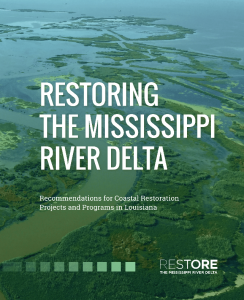Conservation Groups Identify Priority Projects to Restore Louisiana’s Coast
Report outlines opportunities for comprehensive, coast-wide
restoration through key projects
(NEW ORLEANS – November 15, 2017) Today, leading national and local conservation groups working together to address Louisiana’s severe land loss crisis released a report, Restoring the Mississippi River Delta: A Recommended List of Coastal Restoration Projects and Programs, outlining 17 priority projects for restoring the Mississippi River Delta and coastal Louisiana.
Restore the Mississippi River Delta – a coalition comprised of Environmental Defense Fund, the National Wildlife Federation, National Audubon Society, Lake Pontchartrain Basin Foundation and the Coalition to Restore Coastal Louisiana – jointly authored the report, which outlines a suite of restoration projects that, if prioritized for implementation, would build and maintain land across Louisiana’s nationally-significant coast.
The coalition’s priority restoration projects – all components of the 2017 Louisiana Coastal Master Plan, approved unanimously by Louisiana’s legislature earlier this year – were selected from the more than 100 master plan projects for their ability to deliver the greatest impact if implemented quickly. The project recommendations include sediment diversions, freshwater diversions, marsh creation, barrier island and headland restoration, ridge restoration, hydrologic restoration and oyster reef restoration.
The recommendations come at a critical time for Louisiana, which is losing a football field of land every 100 minutes. Without action, the state could lose an additional 2,250 square miles of land over the next 50 years. Meanwhile, funds from the BP oil spill settlement, the Gulf of Mexico Energy Security Act (GOMESA) and other funding sources are flowing to the state for coastal restoration. These resources make it possible to implement large-scale restoration projects across the coast protecting communities from St. Bernard to the Texas line, nationally-significant industries and natural resources, and world class habitats and landscapes.
“Our coast has been vanishing for decades, and studies on the best way to correct the problem have been completed for nearly as long – now is the time for decisive and efficient action,” said Natalie Peyronnin, director of science policy for Mississippi River Delta restoration at Environmental Defense Fund. “State-of-the-art science backs each of these 17 recommended projects, which will work together to set us up for further success and land gains down the road.”
“Louisiana faces very real threats – sea level rise compounded by subsidence, combined with the continued tragic waste of the Mississippi River’s sediment,” said David Muth, director of Gulf Restoration with the National Wildlife Federation. “Our challenges are great, but our current opportunity is even greater. We can use the substantial funding the state is poised to receive and the immense public and political support for the projects we are recommending in this report to protect and maintain as much of the coast as possible.”
“As we wrap up one of the most active hurricane seasons in recent memory, we know that Louisiana has no time to lose when it comes to strengthening the coast and protecting vulnerable coastal communities,” said John Lopez, director of the Coastal Sustainability Program at Lake Pontchartrain Basin Foundation. “Sea level rise projections and extreme weather impacts will only worsen. Louisiana’s people, wildlife and economies are counting on swift and strategic progress on restoration to deliver maximum benefits and best returns on our investments.”
“In this race against time, Louisiana must use the most precious and powerful resource at its disposal – the Mississippi River and its land-building sediment,” said Kimberly Davis Reyher, executive director of the Coalition to Restore Coastal Louisiana. “If Louisiana hopes to maintain a sustainable coast in the face of sea level rise and subsidence, sediment diversions must be advanced quickly to capture this precious resource that flows past our wetlands every day.”
“Louisiana’s Coastal Protection and Restoration Authority should be commended for the significant and real progress it has made over the previous decade, particularly in restoring barrier islands,” said Cynthia Duet, deputy director of Audubon Louisiana. “There is no greater issue facing Louisiana than the ongoing disappearance of our land. We stand ready to work with state and federal agencies, elected officials, community members and other stakeholders to advocate for these important projects and expedite their implementation.”
Read the full report, Restoring the Mississippi River Delta: A Recommended List of Coastal Restoration Projects and Programs, here.
Please contact Emily Guidry Schatzel, schatzele@nwf.org, for a recording of the telepress conference.
CONTACT:
Jacques Hebert, National Audubon Society, 504.264.6849, jhebert@audubon.org
Elizabeth Van Cleve, Environmental Defense Fund, 202.553.2543, evancleve@edf.org
Emily Guidry Schatzel, National Wildlife Federation, 225.253.9781, schatzele@nwf.org
Jimmy Frederick, Coalition to Restore Coastal Louisiana, 225.317.2046, jimmy.frederick@crcl.org
John Lopez, Lake Pontchartrain Basin Foundation, 504.421.7348, jlopez@saveourlake.org
Restore the Mississippi River Delta is working to protect people, wildlife and jobs by reconnecting the river with its wetlands. As our region faces an ongoing and severe land loss crisis, we offer science-based solutions through a comprehensive approach to restoration. Composed of conservation, policy, science and outreach experts from Environmental Defense Fund, National Audubon Society, the National Wildlife Federation, Coalition to Restore Coastal Louisiana and Lake Pontchartrain Basin Foundation, we are located in New Orleans and Baton Rouge, Louisiana; Washington, D.C.; and around the United States. Learn more at mississippiriverdelta.org and connect with us on Facebook and Twitter.
A map of the projects and descriptions are available for download at www.mississippiriverdelta.org/map.
